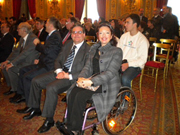
Daniela Bas was only six years old when doctors found a tumor pressing on her spine. Beating the odds, she survived but became paraplegic in less than 20 days before surgery. Now, Daniela heads UN DESA’s Division for Social Policy and Development, where one of the tasks is to promote the Convention on the Rights of Persons with Disabilities and its implementation worldwide.
“I was very lucky,” says Daniela Bas, about having defeated a very rare disease that affects only two or three children in every million and which hardly any child survived in the 1960s. “Probably life knew that I had a mission,” she adds.
Daniela also refers to her parents and the fact that they always stood by her. Coming from a small town on the Italian countryside, the mentality and culture were different in those days. “Because I was paraplegic, I was a ‘handicapped’. The label was there. People started treating me as a ‘handicapped’, except my parents.”
To them, she was exactly the same child in her heart, feelings and personality. She might not be using her shoes anymore. She was wearing them, but it was the tires of a wheelchair that helped her move forward. But the way she commuted was the only thing that had changed.
Her parents also made sure that she could attend the primary school she was supposed to, only five months after she had become paraplegic, despite rules in those days not allowing children with a disability to attend ordinary school. However, three years later in the 1970s, regulations changed and Daniela was legally accepted in ordinary school.
“I think overall in Europe, things have improved. It took about 40 years. When it comes to developing countries, we have to be aware that even if we have the convention, it will take time before we see improvements,” says Daniela.
International expert and broadcaster Daniela graduated in international relations, writing her dissertation on employment of people with physical disabilities and the elimination of architectural barriers. With knowledge of several foreign languages and after completing an exam, she joined the UN’s CSDHA/Disabled Persons Unit in Vienna as a Junior Professional Officer in 1986. In the 1990s, this office moved to New York and later on became DESA’s Division for Social Policy and Development, of which Daniela now is in charge.
“I have to thank the United Nations for being so motivated. It is because the UN started promoting equal opportunities also for people with disabilities decades ago that I am here,” she says.
For about 10 years, Daniela worked for the UN in the area of social development and human rights. She left the organization in 1995 and held a number of other significant assignments including as Special Adviser on “Fundamental Rights” to the former Vice President of the European Commission; as the Italian representative to the European Commission on “Tourism for All”; as Management Board Member of the European Union Fundamental Rights Agency in Vienna, and as journalist and broadcaster for Italian Radio RAI and Radio24/Sole24 Ore and TV channels.
Concept of reduced mobility
“When I talk about disability, and this is my very personal point, I prefer to talk about reduced mobility. Because that can embrace 80 per cent of the population. For one reason or another in our lives we will have some sort of reduced mobility, temporary or permanent,” says Daniela.
During her years working as a journalist, Daniela focused mainly on leisure and tourism, as these are topics that appeal to people. “In all my broadcast, I was talking about social issues through tourism, trying to convey a message, to educate people and my listeners to this concept of reduced mobility.”
Also behind this choice of focus, is probably Daniela’s passion for travel. “For me, travel means freedom. I can move. And I have met many people with disabilities around the world, who have inspired me.”
Focus on the person
Over the years, Daniela has seen progress within the UN on matters relating to disabilities. “The UN has changed its definitions during the past decades from ‘handicapped’, ‘disabled person’, to nowadays ‘a person with a disability’. We are focusing on the person. I think this is a huge achievement.”
Daniela also mentions other signs of improvements in society. When looking at fairy tales from the old days, the “bad guys” of the stories were often portrayed with some sort of disability. The cat in Pinocchio was blind, Captain Hook in Peter Pan had a hook instead of an arm and the wicked queen in Snow White probably had scoliosis. Nowadays, the stories are different and characters with disabilities are portrayed in a positive way. “This tells us that things have improved and that all the efforts of the UN during the last decade are paying off,” says Daniela.
Working for change and advancing rights
Three months ago, Daniela returned to the UN and her area of expertise as the Director of UN DESA’s Division for Social Policy and Development. Daniela highlights that through DESA’s work, three disability-focused instruments have been adopted at the international level.
First there was the World Programme of Action concerning Disabled Persons in 1982; then the Standard Rules on the Equalization of Opportunities for Persons with Disabilities in 1993; and lastly the Convention on the Rights of Persons with Disabilities in 2006. Pakistan is the latest country to ratify the convention, making 103 the total number of countries which have ratified so far.
“I hope the convention will help countries as well as the UN system to promote the rights of persons with disabilities in all aspects of society and development,” says Daniela. She also hopes that the convention will bring about raised awareness about disability as a development and human rights issue as well as the situation of persons with disabilities on the ground. “Persons with disabilities should enjoy equal opportunities and a better quality of life. It takes decades, because it requires a cultural change.”
Daniela also underscores UN DESA’s cooperation with civil society and the possibilities created when we all work together. Member States, civil society, UN agencies and NGOs at grassroots level all play a part in affecting people and bringing about change.
Meeting to evaluate progress made in the implementation of the convention
Next on the agenda for Daniela and her team is one of the largest meetings of the international community working on disability taking place in New York on 7-9 September. The Fourth session of the Conference of States Parties to the Convention on the Rights of Persons with Disabilities will then be held under the theme Enabling Development, Realizing the Convention on the Rights of Persons with Disabilities.
Member States, the UN and civil society will discuss on-going progress and will share good practices on the effective implementation of the convention around the world.
At the end of this DESA News interview with Daniela Bas, it is clear that nothing is impossible if you put your mind to it. And as said in a quote by Goethe, included on Daniela’s personal website: “Whatever you can do, or dream you can do, begin it. Boldness has genius, power and magic in it”.
For more information:
United Nations Enable:
http://www.un.org/disabilities/
United Nations Enable on Facebook:
http://www.facebook.com/#!/pages/United-Nations-Enable/196545623691523
UN DESA’s Division for Social Policy and Development:
Fourth session of the Conference of States Parties:
http://www.un.org/disabilities/default.asp?id=1571
World Report on Disability:
http://www.who.int/disabilities/world_report/2011/en/index.html
Daniela Bas:
http://www.un.org/en/development/desa/newsletter/2011/june/cg.shtml#cg2

